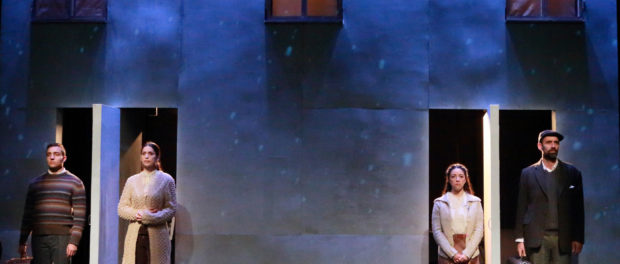“Welcome to the Refugee Hotel”: A Review
Aguirre's The Refugee Hotel is on at the Segal Centre until November 13
When I heard about Teesri Duniya Theatre’s The Refugee Hotel, I knew I absolutely wanted to see it. As someone who is interested in history, the arts, and how they can offer commentary and reflections on current events, it seemed right up my alley. Written by Carmen Aguirre and directed by Paulina Abarca-Cantin, The Refugee Hotel is the story of a group of Chilean refugees who meet after they are placed at a hotel in downtown Montreal to escape the military coup d’état of September 11, 1973. Opening with the bangs of bombs, loud rumble of jets flying overhead, and Salvador Allende’s last words to the nation, The Refugee Hotel immediately situates itself in an important, and extremely relevant, historical and political discussion.
We first meet Flaca (Gilda Monreal), Fat Jorge (Pablo Diconca) and their two children, Manuelita (Mariana Tayler) and Joselito (Juan Grey), as their well-meaning social worker, Pat (Sally Singal), ushers them out of the cold and into the hotel, speaking a cringe-worthy mix of English and broken French. They are soon joined by the two teenagers, Manuel aka Condor Passes (Braulio Elicer) and Christina aka Cakehead (Shanti Gonzales), the escaped prisoner Juan (Ziad Ghanem), and Calladita (Vera Wilson Valdez).
The strength of this cast lies in how they offer us glimpses into the diverse experiences that have led each of them to Canada. Some are from the town, some are from the city; some lost their parents; others, like Flaca and Fat Jorge, have managed to keep their family together, but have lost something else along the way. The Refugee Hotel is, at times, difficult. It’s hard to allow yourself to imagine what they have gone through. At other moments, you find yourself laughing as Bill O’Neill (Charles Bender), the Canadian NGO activist, speaks broken “Spanish” (in the play, he is actually speaking English), to the refugees who welcome him warmly. Conflicts are political, ideological, personal, and internal. Baulio Elicer’s performance as Manuel stood out as one that was able to convey all these inner turmoils thoughtfully and convincingly.

I wish, though, that the other characters’ stories were given as much attention as Manuel’s was. Callacita, the nanny who’s traumatic past has rendered her mute for the better part of the play, is left undeveloped. I left wishing I knew more about her story than just her happy ending. There were a few moments throughout the play that left me feeling this way. Even in a dark comedy, it feels a little strange to leave two suicide attempts virtually undiscussed. It almost felt like they were added to the story as a way to explain the characters’ new nicknames, rather than the reason why they got their nicknames in the first place. Because of this, even though The Refugee Hotel presents difficult material, it sometimes falls flat.

Overall, the goal of this production, though, is to discuss human resilience. “It takes courage to remember, it takes courage to forget, it takes a hero to do both,” explains Manuelita in her opening and closing monologues. In exploring the space between remembrance and forgetting, The Refugee Hotel is successful.
After the show, audience members are also invited to take part in a free “talk back.” Each night, a different special guest is invited to discuss and answer questions with the public. A special speaker series, Intercultural Conversations, is held after Sunday matinees. This is an important initiative, and one of the great strengths of Teesri Duniya Theatre’s production of The Refugee Hotel.
Teesri Duniya Theatre’s The Refugee Hotel, is on until November 13. Enter a chance to win tickets for the November 8 showing HERE. Or you can purchase tickets, $18-$26, HERE. Check out our interview with director Paulina Abarca-Cantin HERE.






